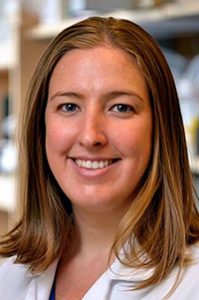Bioengineering Postdoctoral Fellows
The Bioengineering department at Penn Engineering offers a diverse range of research opportunities for postdoctoral fellows in a highly energized and collaborative environment. Penn’s campus is located in a vibrant part of Philadelphia and includes both the engineering school and medical school within one city block, fostering opportunities for interdisciplinary research that extends from the basic sciences to clinical translation. Post docs can choose to live near the beautiful campus or live outside the city and commute to campus via the many convenient regional rail lines. To assist with job placement upon completion of training, Penn’s Career Services offers various programs including a series of professional development seminars on topics such as “The Academic Job Search” and “Opportunities Beyond Academia.”
Postdoctoral Fellow Spotlights:
 Molly Sheehan
Molly Sheehan
PhD, 2014, Biochemistry and Molecular Biophysics, University of Pennsylvania
Postdoctoral Fellow in the Chow Laboratory
Background
“I have worked in de novo protein design and protein engineering since my undergraduate work in the lab of Robert Fairman at Haverford College (on small beta hairpin peptides that assemble into amyloid oligomers). I earned my PhD in biochemistry and molecular biophysics here at the University of Pennsylvania in the lab of P. Leslie Dutton. During my doctoral work, I created robust artificial proteins for electron transfer and oxygen transport, by establishing new principles for making hyperthermally stable, yet highly dynamic, proteins.
I now work in the laboratory of Professor Brian Chow in Bioengineering, moving the field of de novo protein design into mammalian cells to realize its full translational potential, especially in molecular and metabolic imaging, whereas artificial proteins to date have only been produced by chemical synthesis or in bacteria. Dr. Chow is a pioneer in the field of optogenetics. His mentorship, along with the vast resources and collaborations that Penn has to offer, are providing me the expertise to expand de novo protein technology into new realms.
In my post doc so far, we have invented de novo far-red fluorescent proteins that are functional and well tolerated in human cells, perhaps surprisingly so given their completely artificial origin. This new class of optogenetic proteins is highly useful for deep-tissue imaging of proteins and cells, and we now have produced ones that are one-third the size of canonical fluorescent proteins like GFP. I am now further developing these technologies toward compact reporters of neurophysiology and genetically encoded MRI contrast agents for functional imaging. I believe that we can really impact studies of human disease by revealing the underlying physiological dynamics through molecular imaging with our novel imaging tools.”
 Ankit Khambhati
Ankit Khambhati
PhD, 2015, Bioengineering
Postdoctoral Fellow in the Complex Systems Group
Background
“Ever since high school, I dreamed of studying the brain’s complex circuitry. Inching toward this goal, I earned my bachelor’s degree in electrical and computer engineering at Carnegie Mellon University. I was drawn to Penn for graduate school to learn how engineering could play a greater role not only in understanding electrical firing in the brain but also in building tools to diagnose circuits that go awry in disease.
As a doctoral student, Penn afforded me a rich interdisciplinary culture to push the translational impact of my research and to collaborate with faculty in the Perelman School of Medicine. Under the supervision of bioengineer and neurologist Dr. Brian Litt, I studied large-scale circuit dysfunction underlying drug-resistant epilepsy. We built cutting-edge computational tools to map brain networks involved in the initiation and propagation of debilitating seizures, using data collected from patients at the Hospital of the University of Pennsylvania. Beyond research, Penn provided a complete graduate experience, with opportunities to teach and mentor students, pursue industry-level summer internships, and contribute to the undergraduate community through a residential graduate associateship.
After graduating, I continued as a post doc in Penn Bioengineering with Dr. Danielle S. Bassett – a renowned network neuroscientist mapping the brain’s connectivity to cognition and behavior. My research has focused on understanding how brain networks alter their complex structures and reconfigure under the influence of endogenous and exogenous control. These efforts are bolstered by rich data sets that image brain dynamics at high spatial and temporal scales. By dissecting how perturbations predictably alter brain networks, we can begin building more robust interventional approaches to address neurological and psychiatric network disorders.”
